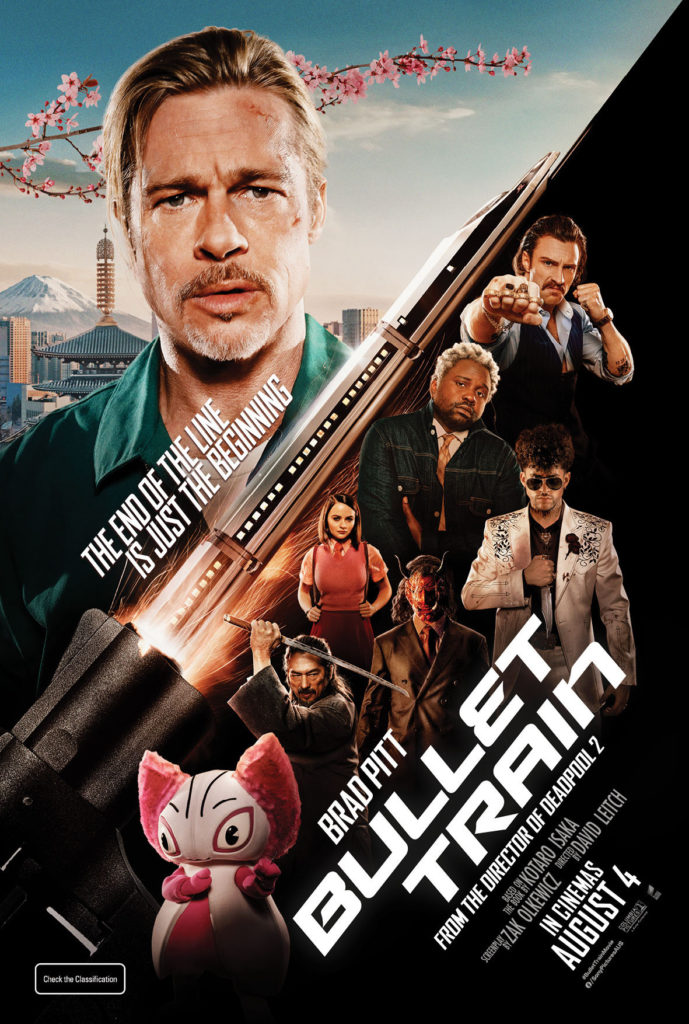Japan has its fair share of bombastic action films and novels, but it also has many mannered and cleverly compartmentalised stories that unfold like so many origami cranes. Director David Leitch (Fast & Furious Presents: Hobbs & Shaw) is not one for subtlety and never has been. In Bullet Train, Leitch has taken the puzzle box of author Kotaro Isaka’s superbly titled Maria Beetle and shot it, smashed it, poisoned it, and ran over it with a train. It’s quite a different experience to the book, but it’s not the worse off for it: Bullet Train is a literal high speed breakneck action comedy that keeps the audience engaged right up to the largely superfluous third and a half act.
Ladybug (Brad Pitt, The Lost City) has been assigned a simple job in Tokyo: get on the bullet train, steal a briefcase, and get off at the next stop. What Ladybug hasn’t counted on is that the train is filled with various people in similar lines of business: hired guns Lemon (Brian Tyree Henry, TV’s Atlanta) and Tangerine (Aaron Taylor-Johnson, The King’s Man), knife man Wolf (Benito A Martínez Ocasio, TV’s Narcos: Mexico), and poison expert Hornet (Zazie Beetz, TV’s Atlanta). Also on board is Kimura (Andrew Koji, Snake Eyes: G.I. Joe Origins), another gunman, who has his own reasons to liaise with a sinister white girl who calls herself the Prince (Joey King, The Princess). In one way or another, everyone’s paths will intersect — and crime lord the White Death (Michael Shannon, Abandoned) looms over them all.
Despite its multiple killer deep cast, Bullet Train is straightforward in its storytelling: it is, after all, on rails. Pitt is the star, but not the film’s sole focus. Ladybug’s self-help platitude dialogue places him above everything without coming across as winkingly referential, and Pitt brings the right level of paradoxical dumb optimism and world-weariness to proceedings. Henry and Taylor-Johnson are a classic duo the likes of which you don’t see much of anymore outside of revivals of Kiss Me Kate or The Drowsy Chaperone, and really that’s all you need.
The film’s biggest departure from the source material, beyond the obvious of filling a speeding Japanese train with distinctly non-Japanese passengers, arrives in the form of the Prince. The Prince is the most quintessentially Japanese element of the novel, a sociopathic Japanese schoolboy obsessed with the levers of power. King’s character is a strange transplant because the script, by Zak Olkewicz (Fear Street: Part Two – 1978) has to freight everything with meaning rather than the neat but still improvisational style of the original story. By the very nature of her foreignness, there’s no room for spontaneity – and this has the knock-on effect of derailing the movie.
Where the book ends, the film tacks on at least twenty minutes of explosive action that completely contradicts the spirit of the book: where Maria Beetle has something to say about the antics you can get up to on a train without disrupting the rail network, Bullet Train becomes a meditation on Westerners using another country as their playground and potentially destroying the national psyche in the process. You won’t find anything as deep as this in the script, but Bullet Train isn’t so much guilty of orientalism as it is of bowing to the voracious needs of the blockbuster machine. When your setting has an end of the line built into it, it’s an option that can be taken, and sometimes should be. The fact that the final scenes of the film look far more fake than anything on the completely fabricated bullet train set goes a way towards ruining the illusion, and sometimes less truly is more.
Up to that point, Bullet Train is fun, funny, and slick. The climax is a let down rather than bad, and at the very least it has spectacle going for it. Leitch has an overall better handle for controlling his film than he did Deadpool 2 and the frequent digressions serve the story rather than distract from it; outside of the seemingly endless masked battles that permeate the end, you always know who is fighting and what the stakes are – even if most of the time those stakes are simply seeing Brad Pitt attacked in increasingly desperate ways. The majority of Bullet Train is good; it’s just that there’s a little bit too much of it.
Bullet Train is a stylish movie without a shred of verisimilitude to its name: it wasn’t shot in Japan and it probably would seem as alien to that country’s citizens as it would the rest of the world. The rarefied air that is breathed by these lowest common denominator thugs makes for an appealing exercise in contrasts that, while imperfect, offers the right ratio of splatter to laughter and a friendly selection of passengers to share the ride with.
Bullet Train opened in Australian cinemas on August 4, 2022.
Directed by: David Leitch.
Starring: Brad Pitt, Joey King, Aaron Taylor-Johnson, Brian Tyree Henry, Andrew Koji, Hiroyuki Sanada, Michael Shannon and Sandra Bullock.

